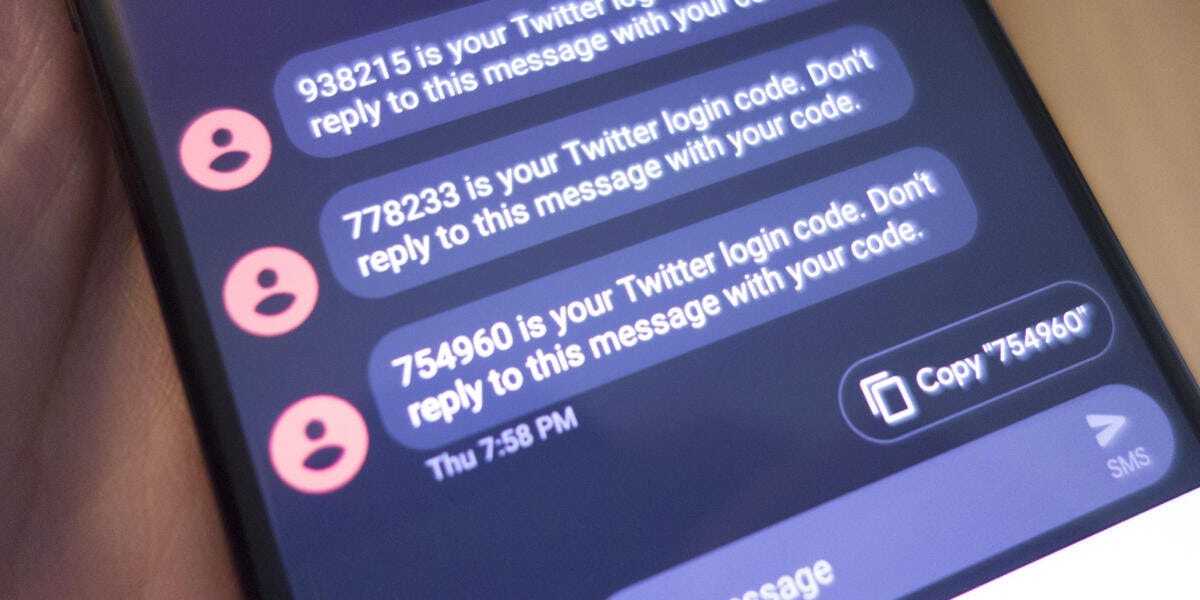deleted by creator
Technology exists to keep all your personal data exceptionally secure. Modern encryption is incredibly difficult to break (impossible really).
Humans are fundamentally insecure. Any time you read about a data leak, it’s because somebody stupidly opened an attachment or fell for a scam. Any time someone gets “hacked,” they didn’t. They gave away their information. Human error and a lack of education are the problems.
While I also disagree with the claim that technology is “fundamentally” insecure, it’s unfortunately not that often made by smart and caring people.
Are Internet security and Internet privacy incompatible goals?
They are if the security is tied to knowing that an account is a person.
I’ve been considering getting a pager or a burner phone just for this
Just get a virtual DID number from something like Voip.ms or virtualphone. There may be other providers out there that use crypto for payment for added privacy, but if all you want to do is be able to keep your real phone # off the grid, these work.
usually they check for VOIP numbers and give you an error. Has to be legit.
Never had that problem with the Google voice service
Yeah yeah it’s google, but it gives numbers that work
Google voice is hit or miss. It’s worked for a lot of smaller sites for me, but the bigger / more corporate it is, the less likely it seems to work.
Last time I checked, Google Voice is only available for US residents. Not sure if there’s alternative.
Most phones are dual Sim these days
Better to not associate this number to your main phone anyway. Less likelyhood to have the info stolen from you.
Can pagers receive text messages? I thought they are closed ecosystems, basically?
I absolutely love this.
Phone numbers social security numbers
Stop making personal information into digital ids because when it inevitably ends up in some kind of data breach. These companies all throw their hands up saying sucks to be you.
Yeah, just generate a unique ID and ask only for the information you actually need.
Nah, man. Gotta get my $2.97 check.
What I hate is when they want you to store “secret” information like your mother’s maiden name/ first pet name for later verifications. You know these are stored in plain text of course. My own damn government does this stupid shit, and they’ve had several hacks of PII including gun registrations because as far as I can tell, nobody competent works in government IT.
Security questions don’t care what you put in there. It’s not an exam. It’s basically just an alt password.
I just generate a string of alphanumeric text from my password generator and stuff those in there. If I lose my password vault somehow I’m cooked anyway, so.
I choose random questions and store the random passwords that I use as answers in my password manager. It’s also more secure because people can’t just Facebook stalk you for answers.
I use bullshit answers for these, and save them in the notes section of my password manager.
Please. It is the most annoying part of trying to use some sites and I rather not give out my number to people who store important info in plain text files.
Yes. Don’t forget your phone number will be exposed to the public when the business gets hacked.
Not if. When.
Bane of my life as about a year ago my dad switched his sim and immediately started pestering me about not being able to log into his accounts.
Yes he got rid of the old number completly and expected me to somehow make his logins work. This is still going on to this day when he complains to me something doesn’t work it’s because he’s tied it to his old phone number.
deleted by creator
deleted by creator
Nah, there are more than enough algorithms available that won’t work on quantum computers, I’m not too worried about that
I want to preface this response saying I full agree with this, I want something like this to happen, I am responding because of some concerns I have. The real major one: How do you verify the authentication part of the data security chain?
A PGP key alone does not authentically validate that you are who you say you are. When the source is the untrusted party, it doesn’t accomplish the site’s goal. It’s the equivalent to me handing you a piece of paper saying “I’m John Smith and this is what I use to say I’m this” which works amazing for trusted exchanges, but when the source is “just trust me bro” it doesn’t solve anything for the website owner.
Websites get around this by having trust certificates/root servers that are co-signed with the PGP key. However, we lack any system like that for personal identities. Arguably, setting up such a system would isolate most of the known internet, as it is a significant roadblock, much like how SSL certificate usage was a huge roadblock for sites before Let’s Encrypt became a thing.
This setup would be amazing for logging into sites. However, it fails to accomplish what the websites that are asking for PII are looking for, which is verification that their user is who they say they are, and not a random third party.
To reliably use this setup, we would need something similar to Let’s Encrypt, but for user identification. The issue with that is it would become the de-facto attack vector (for both law enforcement and criminal parties), and that site would need to require PII to address the biggest concern on these sites, which is that you are who you say you are, and not Jo Smo or a bot looking to harvest data. Additionally, as mentioned earlier, a massive retraining of the internet would need to be done, which would mostly affect non-tech folk.
I am hopeful that an easy function that won’t violate users privacy comes out, but I don’t think the two topics are compatible sadly
The solution here is distributed trust by proxy. You start with a single exchange between two trusted peers, and build from there. As long as every individual link within the network is trusted, then any route between two disconnected endpoints can be trusted as well. As the network grows there is a very high statistical likelihood that there will exist many individual trust graphs between two nodes, which provides redundant validation.
I have always thought this would make a cool chat app. You enter the network by scanning someone’s QR code to become their validated peer, and then you can theoretically communicate with anyone else on the network by exchanging keys via trust graphs. You could then build a social network on top of it which shows you how many hops it takes you to get to some celebrity or some shit.
tox did something similar with this outcome, but it never took off. Basically with tox each account is actually stored locally, much like how Skype did when it was p2p, but the difference is your account is actually on your device, as in if you lost your “key” you lost your account, when you connected with others, you gave your friends your TOXID which was essentially your public key signature with some added information regarding what you wanted for privacy added to it, and then your messages were relayed through a p2p DHS network. Every communication was encrypted e2e. With tox anyone could create an account with any information, but only people you added were able to message you, and visa versa. The only time you were ever publicly disclosed was during adding contacts to people you didn’t already have, which helped minimize botting on it as bots wouldn’t be able to message you without your ID. The issue with that method was, both parties had to be online to message each other, there was no central server to manage identity and handle users, so every connection was considered trusted since you had to manually add the person via their tox ID.
I expect this solution /could/ be moved into a centralized system for all user accounts, since the only way to add people was manually adding their private key, but I would expect that on large scale, the lack of ability to actually stop problematic users might dissuade platforms from wanting to implement it, since account creation was as easy as just clicking “create account” and no accounts were ever verified server side, which in order to do, brings back to the issue topic: Privacy vs Security
How do they currently solve this problem for passwords? You could just have the register/create account button lead to a pubkey upload instead of a ‘set password’, no?
This problem isn’t addressing password authentication, its the website knowing who you are and that you are legitimate. Websites that collect things such as phone numbers during account creation don’t collect your PII as part of your password procedure. They collect it as a verification that you are an actual being and not a fake account/bot. The ease of being able to go through a forgot password thing is just a positive side effect.
This solution would work amazingly for logging in, there’s no argument for that, but it doesn’t address the elephant in the room: That the website wants to make sure you are a person/legitimate account and not a fake alias or a bot to scrape info, and when you are the only one providing that information that claim can’t be verified.
I’m sad PGP didn’t become a popular way to log into websites. A challenge-response protocol could have even been built into web browsers. Big tech is reinventing that idea as Passkey, but with a very big tech flavor.
deleted by creator
I’m already hearing about restrictions on exporting passkeys and some apps requiring that you’re not running a custom ROM on Android and stuff like that. Makes me worried they’re going to fuck that up and make it restrictive bs
Why should my OS be any of their concern?
From what I heard passkeys need google services framework for some reason. Don’t know technical reasons behind it but I would assume its bs given its google.
Yes, they don’t work without Google Play Services. Google didn’t implement passkeys in Android, only their own services.
I’m living this pain with a custom ROM already, with some banking stuff, Google Wallet, WhatsApp passkeys and I think Netflix (haven’t installed it) block you for tripping up Google’s security tests.
If passkeys become a big thing and they’ll start enforcing them and apps that have those security measures I’m going to fucking firebomb something. REEEEEE
Shit like this is why I don’t have a smartphone anymore. I have a brick phone that half the time I don’t even take out with me.
Passkeys or WebAuthn are an open web standard, and the implementation is flexible. An authenticator can be implemented in software, with a hardware system integrated into the client device, or off-device.
Exportability/portability of the passkey is up to the authenticator. Bitwarden already exports them, and other authenticators likely do, too.
WebAuthn relying parties (ie, web applications) make trust decisions by specifying characteristics of eligible authenticators & authentication responses & by checking data reported in the responses. Those decisions are left to the relying party’s discretion. I could imagine locked-down workplace environments allowing only company-approved configurations connect to internal systems.
WebAuthn has no bearing on whether an app runs on a custom platform: that’s entirely on the developer & platform capabilities to reveal customization.
-----BEGIN PGP MESSAGE----- hF4D7cLqolaUp8cSAQdAOCdAgwhjdDgwk6TsYbey9XLZrKT7ny+KRAORyTPJsmUw Fl1llKK3dYtwrPDUts8CA71uU8D2SOWwrk/mrQxlrP/btjNNj6j1vXehQJ0+FIuc 0sBPAU3onDQoAiPLDU7qky1cgtbgitMp4nGEnZ48Xh8OhWS03d9YfU4iIIuf/AWA MTzzbMLZCLqZrIiJGyE2EgJOLIMAOToxidQ6Z/blrT6W9effeu4GwEB622O0eIv5 ct0jm/e2A6j1Gf/7UsnzeC21ME55/JkDIFQQ5ZrYqRGp9+M0yNHXIhJXQvO+QmHz 1CclNIdwbnupIIy0+eiy+Wn41An/IUV2NJy+bmCxRmqTXZyNrfnPMrelY5imknd9 1oZGuHc6tWqNq0ntjV1sBBsxHtAXtFIBWcqEmUgnpxEBglRxx20thoWvQINisCB4 9ptHAUM9Qjr3tWFdvL5MqOHZ14XQ65bbKXhx5MJmr5yijA== =JKT0 -----END PGP MESSAGE-----No one except this guy will be able to read this. Die out of curiosity muhahahaha
deleted by creator
Thanks, gonna need your phone number to verify that though.
No you don’t! That’s why we have key-signing parties!
Now type it a form that doesn’t allow copy and paste.
A bit of a hacky workaround on Android. Get Keepass2Android, use the included keyboard.
“Paste” whatever via the inbuilt password input functionality. It basically auto types out your passwords. (You protect this behind a master password/and optionally quick accessed by biometrics)
Profit
The California DMV requires you to renew your vehicle registration every year by paying with a bank account number (no card) which is like a 30ish digit number and they disable paste. If you get it wrong they won’t notify you in any way until you get pulled over by a cop who is one bad sneeze away from murdering you. It’s a great system.
I have renewed my CA registration with a credit card going back to at least 2016. A responsible driver would know their renewal failed when their registration document did not arrive via mail.
Nah dude fuck that. The burned of compliance with laws shouldn’t fall so hard on people.
Bank account numbers are, like, 8-10 digits. Certainly not 30ish.
What? Mine are 6 digits. Plus the routing number
Why?
Wdym why? That’s how most bank portals are designed. Copy-paste functionality is disabled and you have to type username, password, authentication code
I think my question was clear enough. The comment didn’t mention banks, I’ve never had a bank that did that, and we generally don’t try to hide our identities from our banks anyway. My best guess was that they misunderstood how public/private keys work, but since that was only a guess, I asked.
tbh ive never had a password box that I can’t copy/paste into
I’ve seen a few. They’re super annoying when trying to use a password manager with a decent password.
Can’t your password manager do autotype? That’s what I use mostly, because I don’t want all my passwords in my clipboard.
Or even just a paper form.
Theres an LTT video where one of the boys intercept all Linus’ calls and texts, classic prank.
You mean the Veritasuim video with linus in it?
To the same audience: quit selling my fucking phone number!
I ditched a phone number I had for 10+ years because it was leaked everywhere. Only a few short months after updating my number with the DMV and a handful of other government agencies I started receiving scam calls/messages again.
At some point we need to adopt some fucking privacy laws. This is absolutely bonkers—is no one else fed up??
Australia has a “do not call register”. It seems to mostly work, but telcos are having trouble with calls originating from outside the network with spoofed caller ID. We still get spam/scam calls from India among other places.
Even if they’re not calling you directly, they are still using your phone number to link you to things and create a shadow profile behind the scenes.
I’m pretty sure a lot of scam calls use machines that call every possible phone number within an area code and see who answers. There is no way to avoid it.
this right here. I stopped getting scam calls years ago, I stopped answering and they just eventually stopped calling. If you don’t interact with the call (interact being ignore it or mute it NOT reject it) and it just goes to voicemail, they seem to eventually stop
If you’re up hunting, or work in specific fields this may not be a reasonable thing to do and that’s at least part of the problem.
This would deem troublesome yea, being said I firmly believe in separating work and home. I wouldn’t be willing to use a personal number for work related activities, at least not public related activities. Being said, I have no good solution for that, at least you are being paid for the scam call I guess.
Job hunting is what I meant. And you pretty much have to use your personal phone for that. I haven’t ever had a company phone. Doubt they’d give it to techs.
Lucky you. I’ve been letting calls from any number I don’t recognize go to voicemail for years and nothing ever seems to change.
I just block and report as spam any spam text messages I get and any calls that get marked as scam likely. It was terrible before the election because I live in a swing county in a swing state and I think everyone was just mass spamming every number in the area code, but since then I haven’t really gotten much, maybe one errant text every 2 or 3 weeks. Which is much better than it was last spring and summer when the amount started picking up for me.
Setup a whitelist, I think it’s native on iPhone and there are multiple Android apps. Only calls from your contact list will ring through. My voicemail is, “You’re getting this because you’re not on my contact list, send a text and I’ll get back to you.”
Oh everyone is fed up but we just elected a guy and government who is sure to make it all way way way worse.
He just helped put the nail in the coffin of the lie that crypto is for anything but scams, don’t worry, it’s gonna get real bad before it gets any better.
In South Africa, where I live, everyone is assigned an ID Number at Birth. You need an ID number, thumbprint scan AND proof of address to get issued a SIM card number due to a law introduced called RICA. It was meant to help fight crime. Worried that the government could listen in to calls or read their SMSs, the criminals just switched to WhatsApp, which also happened to become cheaper than SMSs and gained popularity in this time.
The cops never seemed to crack WhatsApp. The only drug busts that happen are when an open secret becomes laughably too open and when they harass every person arriving from South America at O.R. Tambo international airport just to catch the decoy mules carrying 12g of cocaine (total). Every dealer I ever organised with was over WhatsApp.
So now, woopsi, RICA stopped nothing and just became a liability. That treasure trove of fragile data made its way to scammers and spammers. A total net negative.
I’d encourage everyone else in other countries to apply major pushback to any government proposals in this direction.
Do people still believe that drug trade is ran by criminals?
I am pretty sure in every country, it is controlled either police or the spooks.
I am done pretending otherwise. Criminals are just useful idiots, the real thugs are the police and security apparatus
[citation needed]
https://en.m.wikipedia.org/wiki/CIA_involvement_in_Contra_cocaine_trafficking
This is just one example;)
there are MANY MANY examples don’t be a lazy pelican with your beak open. go look
The person who makes a claim has to back it up
stay ignorant and dangerous friend
“Bitcoin, it just seems like a scam,” Mr Trump said. “I don’t like it because it’s another currency competing against the dollar.”
— Donald Trump
Of course, Trump Coin made just for him is fine. And any security who bribes him. Oh wait now they’re all securities; Gary Gensler was our last line of defense.
Did we? My government leader hasn’t changed nor have we had an election lately
There’s a subset of Americans who are rather like ostriches: heads so deeply buried in the sand that they forget anything exists outside their immediate surroundings. Reminding them that the rest of the world is out there rarely has any positive results, however.
If they could read they would be upset by that.
At some point we need to adopt some fucking privacy laws. This is absolutely bonkers—is no one else fed up??
Look at you, trying to use the government to solve every day problems that face pretty much all of us.
Don’t you know we only focus on gridlock issues to distract us from real issues now?
I do, unfortunately.
lists sourced from drivers licenses and motor vehicle registration records are literally sold by some states.
Yep, wish I’d known that a couple years ago.
Source?
wisconsin literally has an opt-out/opt-in (based on your current status) box on vehicle registration renewal forms, for one.
At some point we need to adopt some fucking privacy laws.
Yeah we absolutely had to ban TilTok because of privacy concerns but the idea of creating a law to protect our privacy is ridiculous beyond all reasoning. The stupidity of the United States government is absolute.
Agreed, but I’m not addressing TikTok specifically but rather policies similar to GDPR.
I’m confused of how this keeps happening to people.
Like I use my phone on most sites that allow it and I’ve never had spam/scam calls really, but I’ve also explicitly unchecked the marketing boxes that appear on the signup so maybe that it.
The last instance that actually happened to me was with entering my university a few years ago for my BS degree. They 1000% sold my contact information as some part of the deans/honors list process. I reached out to them and stopped that so fast.
Don’t worry, here in Europe we are full of privacy laws but I still receive tents of spam calls per day. Usually from non UE countries faking the number with my country numbers.
Anything with a London 020 number is guaranteed to be a man with an Indian accent pretending to be from British Telecom.
quit
sellingdemanding my fucking phone number!FTFY
I have an app called Silence that lets me block calls from numbets not in my addreasbook. Highly recommended
https://github.com/x13a/Silence
Reminder: Dont blindly trust random internet sources!
I set my phone to decline calls from unknown callers years ago.
These calls are already illegal. I used to report them to the FTC but I never heard anything back so I have no idea what happens, but I presume nothing. If I had the time to take them, and if they spoke English, I would record them with the Cube ACR app (which no longer works) and convince them to incriminate themselves. Ask their name, company, location, time/date, whether they ran my number through the DNC registry.
It’s not an accident. They’re not stupid. It is intentional. They want your personal information. Most of your personal information is tied to your email but it’s easy enough to spin up an alias to sign in with. Requiring a phone number ensures that they know exactly who you are and can buy/sell/use your data accordingly. They also know what a giant pain in the dick it is to change your phone number. They also know sales conversion rates are much higher if they can get you on the phone. So yeah, they’re not going to stop doing that.
It is the same thing that happened with US Social Security Numbers, which were originally just tracking numbers for that one purpose that were coopted by capitalists and treated like something special.
It’s not just “capitalists” (whatever that means), every government agency seems to want it, employers and banks are required to ask for it, etc. It’s more than just “some people misused it,” we actually wrote it into regulations.
And at 9 digits, it has only 100 million possible combos. Despite there being 3x that many people in the USA.
999,999,999
It’s 1B. You’re forgetting zero.
Now I know your social security number. You fool!
I remember I was flipping through some of my mom’s old college stuff and there was a club that she was involved with and everyone listed their address and social security numbers. It was wild, no idea why they felt the need to collect socials. But this was a very long time ago.
My college ID used to be my social security number, so maybe it was something like that? Iirc that’s no longer allowed in the US.
Good lord.
Imagine giving an institution like that your money.
I’m in a quest to find a good email provider that doesn’t ask for a cellphone or another email address while creating an account, cock.li used to do this but now it’s “getting back on its feet”
Proton? More like pro Nazi.
OFTL Did they support Trump?
Their founder did, very openly and expressively, it was quite bizarre
Then he tried to walk it back by gaslighting.
“I wasn’t being political” said the man who was clearly being political.
The CEO made a remark about Trump, and used his corporate account for it.
If I recall correctly (no press statement was made by Proton), it was a personal remark on a corporate account, which he was quick to allow anyone to do. It also didn’t support Trump as a whole, just a remark Orangeman made about getting small business a level playing field (which I totally trust from an olicharch).
I’m still sticking with Proton for the foreseeable future, as its privacy awareness and advocacy is still a core business value.
Selfhosted email I guess.
Is that even feasible without getting marked as spam by all the major players?
Hi, I recently set up my own email server
- It’s a huge pain in the ass getting things like DMARC and DKIM and whatever to work. Without those, most providers won’t even deliver your messages. But luckily, there are websites that help you check and fix your configuration
- Even once you do get these things set up correctly, most providers will send your outgoing messages straight to the recipient’s spam folder
- That being said, I believe most providers will mark you as “not spam” if the other person initiates the conversation. So this could be a non-problem if you’re making an email for your business and putting it on business cards or something.
- Mullvad (VPN provider) self-hosts their support email, and they seem to be doing fine.
Hope that helps
Proton?
Just signed up for Tuta and they do not ask for this.
create 2 proton mail account und use each other as a backup e-mail
Don’t u need an existing email to bootstrap that process.
I think you used to be able to “bootstrap” a proton account with a mail.ru account (which needs no prior email or phone), but I don’t think that works any more
nope, you can skip for the first account and then validate after the fact
There used to be a way to make Google accounts with no number but that’s probably been patched. I generally refuse to add numbers if I can help it.
Proton, Mailbox & fastmail are all good options. Best way to avoid it is self-hosting but that is beyond most people (as in time-consuming).
Personally I use mailbox.org, it’s not free, but you are not the product
I have absolutely no need for my phone number, nor do I use it for anything that I couldn’t use a voice app for. Just get rid of them altogether.
Yeah I mean I’d get rid of that and email entirely if I could but unfortunately there are legal and societal expectations.
We need email. It’s one of the few protocols that are 100% in the user’s control. I run my own mail server. I can’t do the same for whatsapp.
We’ve added a lot of checks to email (SSL, DKIM, DMARC, SPF) so it’s very easy to identify spam these days. It’s also easy to avoid giving any two companies the same email address. That’s something much harder to avoid with a phone number.
For 2FA, per-account email addresses and authenticor apps are the best approach for privacy.
I run my own mail server. I can’t do the same for whatsapp.
No, but you can do the same for a wide variety of chat apps.
it’s very easy to identify spam these days
LOL then why is my inbox constantly full of spam?
Platforms like SimpleX solve spam by requiring participants to have an invitation to message you. You can either send them a 1-time invitation or you can use a semi-permanent one that can be posted publicly and rolled as necessary without losing contact with anyone you’ve already connected with, so by the time it’s mined somehow and sold to some company, it’s already changed.
For 2FA, per-account email addresses and authenticor apps are the best approach for privacy.
LOL what? No they’re not. How does an email protect your privacy over just a username?
Zoomer spotted, opinion rejected. Email >>>>> chat apps.
Zoomer spotted
Haha, not even close
Email >>>>> chat apps.
Wrong again. But please, do go on.
LOL what? No they’re not. How does an email protect your privacy over just a username?
They said per-account email addresses, presumably meaning that when giving out an email address, you would use a different one for each service. That way, they couldn’t be used to link you across services, and you could easily delete one (and know who to blame) if it was abused.
Yes, I understand how email aliasing works. Again, how is that more private than a username?
I don’t see a claim of it being more private than a username. Perhaps the person you’re arguing with views them as equally private, or is thinking of services that require some form of contact info. I can’t speak for them.
It’s right here:
For 2FA, per-account email addresses and authenticor apps are the best approach for privacy.
I can’t speak for them.
But you just did.
You’ll pry email from my #coldDeadHands, but I haven’t had a phone number for a decade.
Get married, then legally, you only need one lol.






































